do you want boiled egg skin? 🥚🥚🥚🥚🥚
the future of beauty, skin delivery tech and how to spot marketing BS
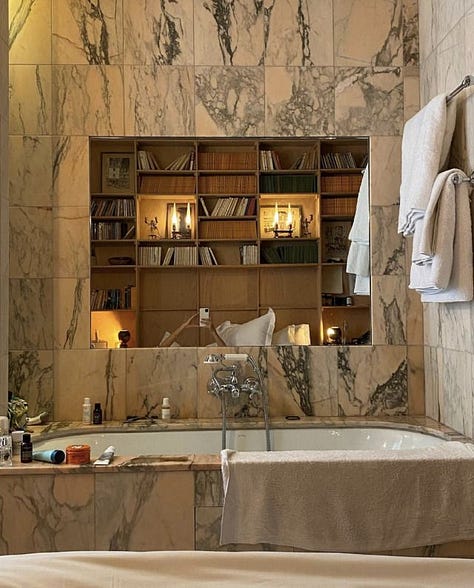
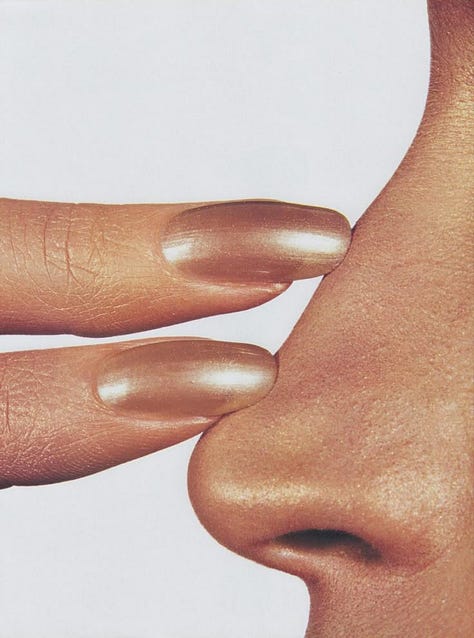

Happy Easter!
I hope you find and eat many eggs these 2 days (although I know that not all countries have 2 easter days but we do!). I love eggs. they are my favourite thing in terms of shape, versatility, and taste. I grew up with our neighbours’ chickens, mud-bathing in our garden so we always had fresh eggs. there is truly nothing better.
So naturally, I love egg-shaped beauty blenders and there are a few korean beauty brands built around eggs, because boiled egg skin is a thing:
I wish there were DIY skincare recipes involving eggs that I could recommend, but unfortunately, there isn’t a single egg-based method I’d feel comfortable endorsing. I remember making egg hair masks back in high school, but honestly it was just gross. please refrain.
What I do want to talk about today is how skincare made some fascinating headlines this week, what the secret is to quality skincare that no-one talks about, our monthly marketing debunk, how the journalists at Vogue Business are envisioning the future of beauty, and at the end of this letter I’ll share my favourite beauty (re)purchases and new launches.
oh BTW! I’m currently deep into researching all the major laser treatments out there and I’m working on a Google Sheet compiling everything I’ve learned. I’ll be fact-checking it with a few trusted professionals before sharing it with you.
I had my first Fraxel laser treatment last month and I’ve got loads to share! especially about my post-laser skincare protocol that really helped my skin heal, get calm and made the results even better. I’ll include all of that in a dedicated Substack issue on laser treatments in two weeks’ time. Make sure not to miss it!
// beauty + cosmetics in the news this week //
25 years on, Patrick Bateman’s unsettling morning routine is normal, CNN
I loved this post by diet_prada - tariffs on K-beauty in the US make people panic buy:
What we will look like in 20 years, Vogue Business [paywalled] - I break down this article and other articles from the series “Future Of Appearance” further in this letter, so no worries if you don’t have access to Vogue Business :)
Skincare tourism is huge these days, and Seoul is the place to go. BBC
An example of 1 afternoon with 4 skin treatments in a clinic in Seoul, Youtube
// No one talks about this, but it might just be the most important element of your beauty product //
We often focus on what’s in our skincare – vitamin C! peptides! retinoids! – but the real magic is how those ingredients make it to where they’re needed: inside your skin.
Because here's the thing that no one tells you: without the right delivery system, even the best active ingredient might just sit on the surface and do nothing. This is not true for all actives though, niacinamide, urea and glycolic acid are water soluble and small enough and can penetrate skin on their own. But many actives can’t! This is why I love science-first, innovation driven beauty brands way more than brands that formulate their products following a briefing by their marketing team (= often people that don’t know much about the science of skincare but are often more occupied by marketing trends and sales).
What is a delivery system in skincare?
A delivery system is the technology that helps transport active ingredients past the surface of your skin – through the stratum corneum – and into the layers where they can actually work. It ensures the right actives show up at the right destination, in the right condition, and at the right pace.
Why it matters:
An unstable ingredient (like vitamin C) needs protection to stay potent until it reaches your skin.
A powerful active (like retinol) might need slow release to avoid irritation.
A large molecule (like some peptides) might need a carrier to even make it through the skin barrier.
Common delivery technologies you’ll see:
Encapsulation (e.g. liposomes, microspheres, nanocapsules): protects actives from degrading and can allow for time-release effects.
Lipid-based carriers: mimic your skin’s natural barrier, helping actives slip through more easily.
Microemulsions and nanoemulsions: help solubilise and evenly distribute actives for better penetration.
Film-formers or polymers: create an even layer on the skin to control release and boost stability.
These are just the basics for now, but please let me know if you want a deep dive in a future post.
Also please ask me about my favourite products with advanced skin delivery technology in the comments or DM if you wanna know what would work best for you, happy to share my advice!
// the future of beauty //
I've been deep-diving into Vogue Business's "Future of Appearance" series [paywalled except for this intro article] - plus synthesising it together with my own crystal ball- and let me summarise: the future of beauty is equal parts fascinating, terrifying, and wildly unequal. Let's break down what we might look like in 20 years, whether we should want that, and what it all means for our wallets, the planet, and our mental health.
living (much) longer, looking (much) younger
The overarching theme: By 2045, living to 100+ won't be exceptional but expected. at least for those who can afford it. According to UN projections, we'll have 3.2 million centenarians by 2050, compared to around 573,000 today. A wild cocktail of biotech innovations that will make today's Botox and fillers look positively primitive is powering this shift.
“In recent years, how consumers have engaged with beauty trends and products has shifted,” says Chloe Green-Vamos, VP of global innovation strategy at beauty conglomerate Estée Lauder Companies (ELC). “Today, trends are influenced by a spectrum of lifestyle factors, including medicine, technology, food, health, social media and wellness.” She notes that increased awareness of longevity and slow ageing is changing the role of beauty products, with consumers seeking “transformative, noticeable and meaningful benefits”.
Think stem cell therapies that regenerate tissue rather than just plump it, bioengineered implants that integrate with your actual cells, and the casual elimination of scarring altogether by tapping into how embryos heal (!!). According to plastic surgeon Dr. Tze Kong, we're moving from merely "restoring" to actual "regeneration" of the body at a cellular level. This is gonna be a huge part of the beauty industry but it’s already started. If you want to know more about the latest (current!) innovations in regenerative skincare, I wrote about that here :)
Ongoing research into extending skin cell lifespan and ‘waking up’ dormant cells could slow ageing altogether. If advancements like mRNA-based therapies (messenger ribonucleic acid, currently used to treat diseases by replacing a protein that is missing or doesn’t function effectively) continue to develop, Ghadiri says, “this could have implications in anti-ageing by potentially using mRNA vaccines to target cells related to ageing, such as fibroblasts and keratinocytes, to reverse age-related changes”. This means products formulated or developed from mRNA advancements could maintain a skin cell’s life for longer, improving skin quality and vibrancy. Dna coded skincare - Vogue Business
When we focus our gaze on future retail we can expect DNA-coded products tailored to your specific genetic makeup, wearable nanobots monitoring and releasing hormones in real-time and climate-adaptive formulations that respond to your environment. Noble Panacea's OSMV technology that delivers time-released ingredients is just the beginning.
Beyond menopause, advanced wearable technology will integrate with AI to analyse lifestyle data and hormonal patterns, delivering instant and personalised product recommendations. “We’re talking about maintaining skin luminosity, optimising fat distribution and supporting muscle definition based on real-time hormonal profiles,” says Dr Sohère Roked, functional medicine and hormone specialist.
As always, there's the thorny question of who gets access to this future. When we think about living to 150 with the face of a 35-year-old, we need to ask: who exactly is this "we"? Because it certainly won't be everyone.
AI knows your skin better than you do
Remember when we thought virtual makeup try-on was fancy? Cute. The retail spaces of tomorrow will feature AI mirrors analysing your micro-expressions and even your scent to create "beauty passports" synced with your digital footprint. I'm too excited about this and wish I was born tomorrow if i’m being completely honest with you. I would looove to have a deeply personalised scent that can change with my environment or mood and I would love my skin to stay glazed like a boiled egg for longer than is currently possible. And although some waves of feminism tell me not to obsess about this, im just a girl living in an unfair world, so let me just have some control over/ fun with some things, like what cute products are in my bag, or the way scent makes me feel, since I can’t change the patriarchy, apparently.
On futuristic surgery: plastic surgeon Gary Linkov speculates that within a decade, his job might involve directing nanobots to perform procedures without even touching a scalpel. I'm not sure if I rather have a human error or an AI error during a procedure but im curious: if the chance of errors decrease with AI, what would you rather go for?
And while a big part of me finds this absolutely thrilling (imagine never dealing with hormonal acne again because your wearable caught the hormone shift before your skin even noticed), we also have to be realistic: there are MAJOR privacy concerns. As skin expert Jasmina Vico asked pointedly, "Who actually owns your face at that point?" when companies have your entire biological profile. Could they "sell this data to whoever they want"? (if legislation changes regarding tech and privacy will still be as slow as today, ehm probably yes).
why we should be skeptical
I've read enough science fiction (and lived through enough tech hype cycles) to know that what gets predicted and what actually happens can be wildly different. Remember when Google Glass was supposedly going to transform how we interact with the world? Yeah.
Some healthy skepticism about these predictions:
Economic reality check: Most cutting-edge treatments will be accessible only to the ultra-wealthy at first, creating an even more dramatic appearance gap between economic classes. (I imagine scarless facelifts that give you your exact face at 25 back, or stardust express-facials in space with the latest technology as a class-flex, or even more extreme versions of stem cell regenerative therapy being highly exclusive and expensive.)
Regulatory hurdles: Many innovations mentioned (especially involving human stem cells, gene editing, or mRNA therapies for cosmetic use) face massive regulatory obstacles
Environmental impact: Professor Kate Fletcher puts it bluntly: living longer means consuming more resources on a planet already exceeding its limits. The math simply doesn't work unless consumption patterns radically change or there will be some magical solution for waste, or human greed + destruction.
what I actually think will happen
Looking at both Vogue's predictions and my own list, here's what I genuinely believe will transform beauty in the next 20 years:
Science-based beauty will win: The pendulum will swing away from "clean beauty" fear-mongering toward evidence-based formulations. Consumers will demand actual proof, not just pretty marketing. There will be better systems for this.
Hybrid everything: The line between skincare, makeup, medicine, tech and wellness will completely dissolve. Your foundation will deliver active ingredients, your supplements will be personalised to your genetic profile, and your moisturiser or skin patches might communicate with an app.
Sustainability transparency: Brands without genuine full lifecycle assessments will be called out. The era of vague claims and greenwashed marketing is thankfully ending. There will be better systems to analyse all steps in the process of product development and sales.
Preventative approach: The demographic divide will be increasingly visible - those who had access to preventative treatments in their 20s-30s will look noticeably younger in middle age than previous generations.
The cultural integration of beauty: Western beauty standards and medicine will continue blending with global practices. Ancient wisdom from various cultures will be scientifically validated and mainstreamed.
Body treatments catching up: The ultra-focused attention on facial treatments will extend to the body, with equally sophisticated options for everything below the neck.
Personalisation actually delivering: After years of half-baked "personalised" beauty, technology will finally make truly effective custom formulations possible.
What I find most promising is the democratisation of knowledge. Between AI assistants that can parse scientific studies, better review platforms, and a general rise in beauty literacy, consumers will be harder to fool. The days when a brand could just slap "clean" on their packaging and charge double might finally be ending (please!!).
what I'm personally excited to try
While some future predictions feel dystopian, there are innovations I'm genuinely excited about:
Climate-adaptive skincare that responds to pollution levels and environmental stressors in real-time:
Companies like ELC and private research university Massachusetts Institute of Technology (MIT) are researching anti-inflammatory responses at the cellular level to combat climate-induced damage, while Shiseido’s Sun Dual Care technology converts UV energy into skin-activating responses, setting the stage for next-gen beauty solutions.
AI-powered skin analysis that tracks subtle changes invisible to the human eye
Regenerative ingredients that stimulate natural repair processes rather than just temporarily plumping the skin
Smart delivery systems that ensure active ingredients actually reach their target in optimal condition, and access to data about our skin and the product efficacy
What about you? What future beauty innovations are you excited about or wary of? Let me know!
// monthly debunk //
This time I’ll hand you a mini guide to seeing through false beauty marketing, in stead of a case study.
I love a beautifully branded serum as much as the next person, but not all glowing claims are backed by science. Here's how to cut through the fluff and shop smarter:
1. “Clinically proven” – but based on what?
If a brand claims performance but hasn’t conducted its own third-party clinical trials on the finished formula, the data they reference often comes from studies on the individual ingredient. That doesn’t guarantee results – efficacy can change drastically depending on how the formula is built. Stability, delivery system, and synergy with other actives all matter.
2. Watch for overpromises
If a product claims to “shrink pores,” “eliminate texture instantly,” or “detox your skin,” be sceptical. Pores don’t open or close like doors, and while texture and tone can improve, it takes consistency and the right ingredients (plus SPF). Real skincare works gradually, not overnight.
3. Don’t get dazzled by ingredient lists
Brands love spotlighting buzzy ingredients, but a good formula is about how it’s made, not just what’s in it. Stability, dosage, delivery tech, and pH all impact results. Even percentages can be misleading without context, the INCI list never tells the full story, please don’t believe any influencer telling you otherwise.
4. Look past the buzzwords
“Clean,” “non-toxic,” “chemical-free”... these feel comforting, but they’re unregulated and often meaningless. Everything is a chemical, even water. What really matters is the science of formulation, not the fear-based marketing.
5. Ingredient villainising is a red flag
“Free from parabens” doesn’t mean better or safer. These phrases are often rooted in scaremongering, not science. Parabens, silicones, and even alcohols can be incredibly safe and effective when well formulated. It’s all about dose and toxicology – the finished product is what’s assessed for safety, not just the ingredients.
Also worth noting: UK and EU regulations already tightly govern skincare safety, animal testing, and sustainability. Don’t fall for brands that act like they’re doing you a favour by following the law.
an example: “cruelty-free” in the EU
The term “cruelty-free” is not a legally recognised or regulated claim in the EU. Since animal testing for cosmetics has been banned in the EU since 2013, every product should be cruelty-free by default. Marketing with this term implies a superiority that doesn’t legally exist, which is why it’s considered misleading and can even be flagged by regulators. If a brand uses this term in their marketing in Europe, I consider this as a red flag.
the truth about "Free From" claims in EU cosmetics
In the European Union, cosmetic claims are governed by strict regulations to ensure they are not misleading. The European Commission's Technical Document on cosmetic claims provides guidance on the use of "free from" statements.
key principles for "Free From" claims:
Legal compliance: Claims like "free from [banned substance]" are not permitted, as they merely state compliance with existing laws. Lots of brands are still doing this though, with parabens, aluminium, alcohol, “toxins” etc.
Truthfulness: If a product claims to be "free from" a specific ingredient, it must not contain or release that ingredient.
Honesty: Avoid "free from" claims for ingredients not typically used in that product category, as it can be misleading.
Fairness: "Free from" claims should not denigrate legally approved ingredients. For example, stating "free from parabens" implies that parabens are unsafe, which is not supported by scientific evidence.
Informed decision-making: "Free from" claims are acceptable when they assist specific consumer groups, such as "free from animal-derived ingredients" for vegans.
6. False before-and-after photos
Lighting tricks, camera angles, smoothing filters – all common tactics to fake results. I broke this down fully in this soft glow post:
Please don’t trust dramatic transformation pics without full context. Great skincare shows up slowly, yes some products have instant results, like hydration or glow. But pigmentation, blemishes and skin texture always take time to transform.
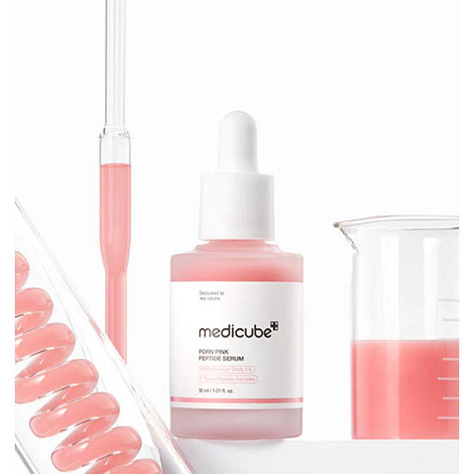
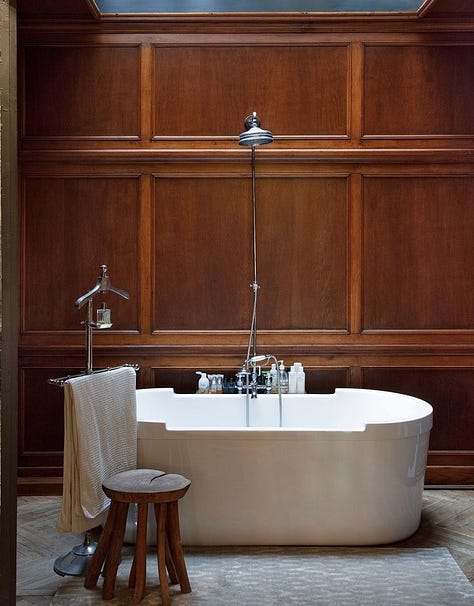
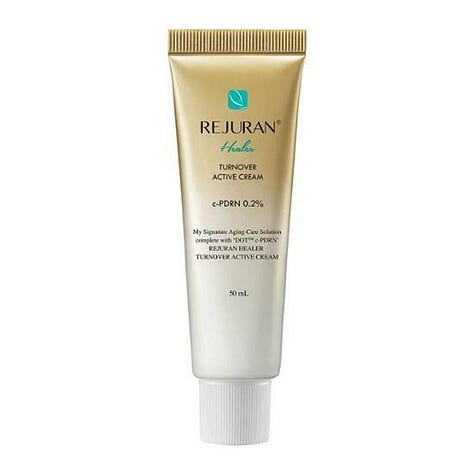
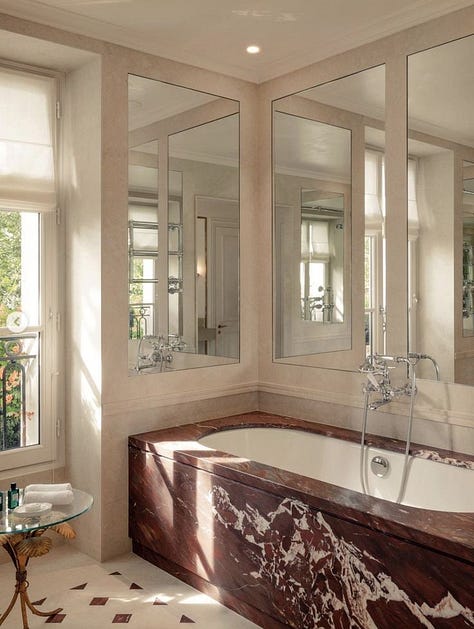
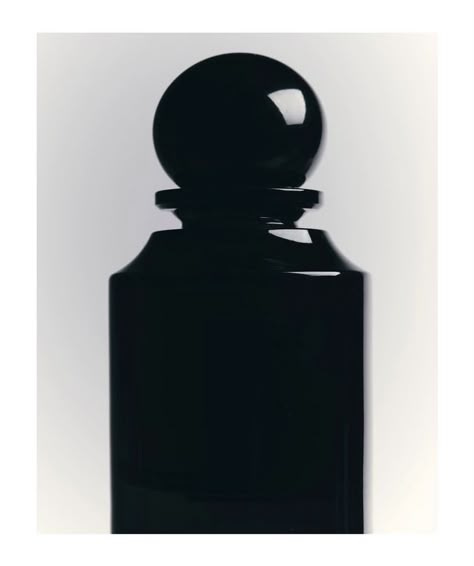
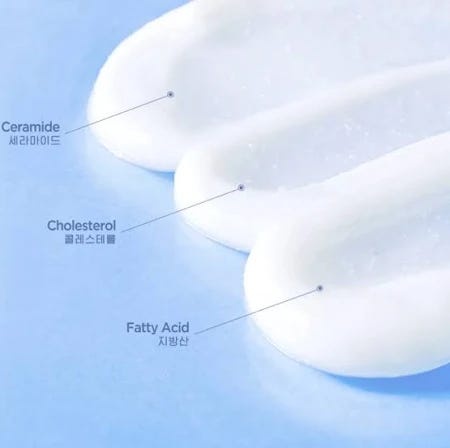
// recent (re)purchases and fresh Soft Glow approved beauty launches worth exploring //
NEW: Lipglass air - MAC cosmetics: a non sticky lipgloss that they just launched
NEW: Augustinus Bader just launched a luxurious sunscreen based on their The Rich Cream
New-ish: medicube PDRN pink peptide serum, medicube is apparently banned on the main K beauty subreddit because of posting fake reviews on there, which is not cool. but I still like their products, lol
NEW: medicube PDRN pink gluthatione mist, its pink and scented and smells like a 2000s balearic summer if you’re into that. I love it despite the scent!
LOVE: Aesturea ATOBARRIER365 cream, instantly iconic Kbeauty product. Amazing moisturiser for sensitive skin, even post laser treatment.
You know me, I LOVE a face mist. So I especially love the mist version of the ATO barrier cream
NEW: Iconic french luxury science-first skincare brand Biologique Recherche launched a body cream that tackles hyperpigmentation issues, I love targeted body care.
REPURCHASED: My current HOLY GRAIL and one of the most popular products in South Korea at the moment: Rejuran healer Active moisturiser , this is the famous salmon sperm DNA injection OG brand and this moisturiser is therefore not vegan
REPURCHASED cause I love how well this works for sensitive skin: The Ordinary growth factor serum - it was part of my post laser skin protocol which I will discuss next time <3
Thank you for reading, don’t hesitate to ask me questions and speak soon!
xoxo Soft glow

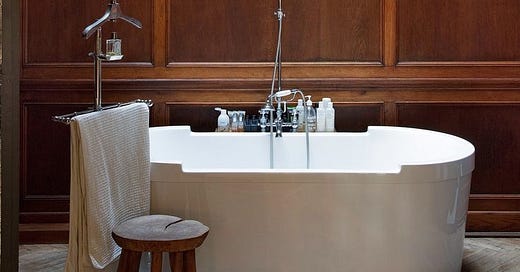


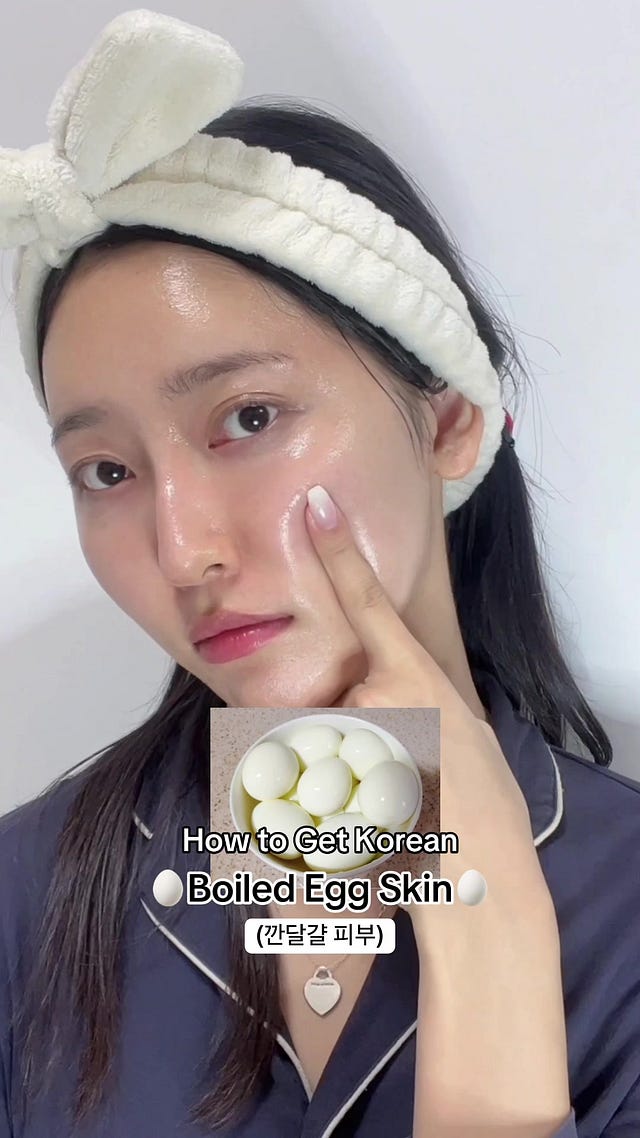

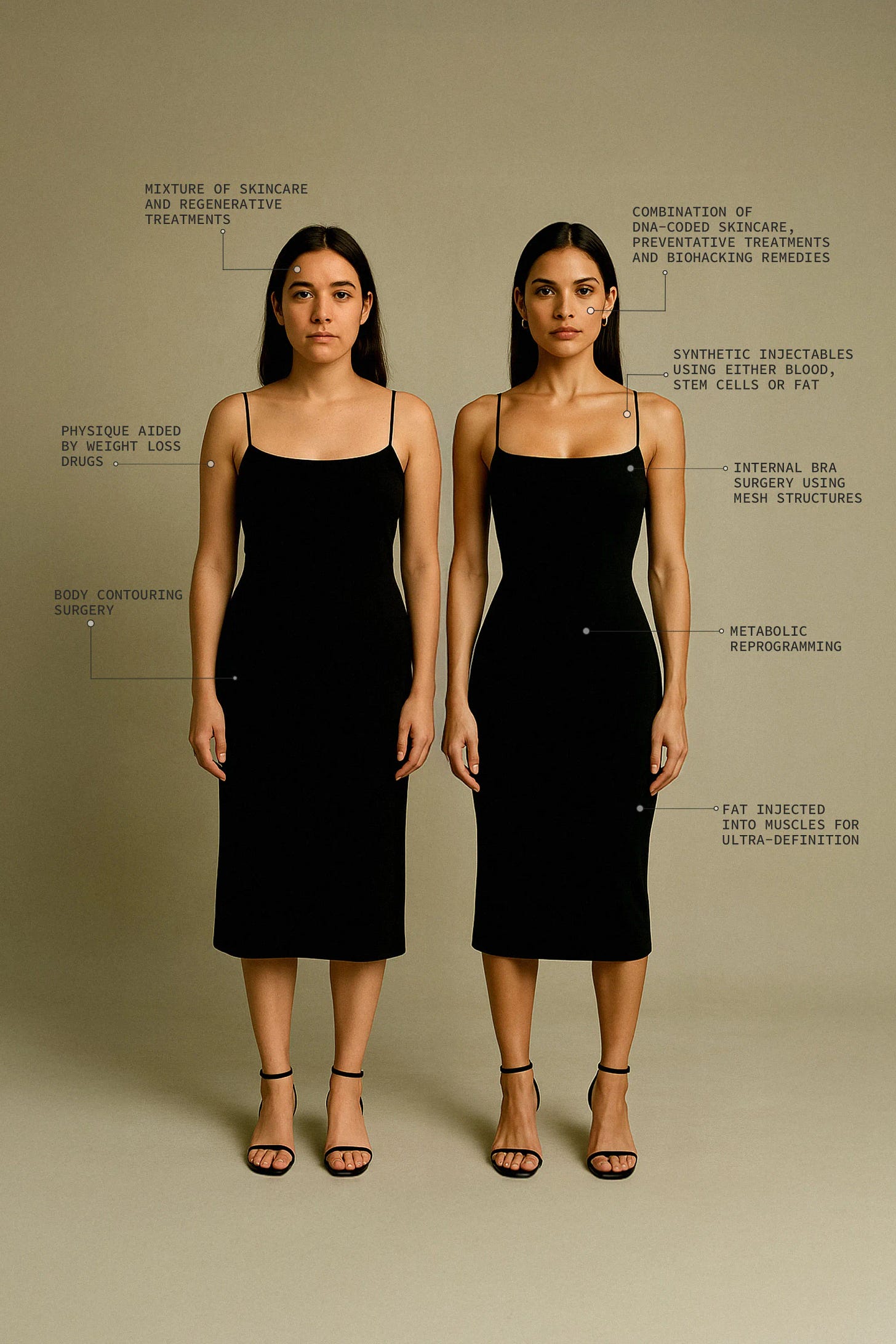




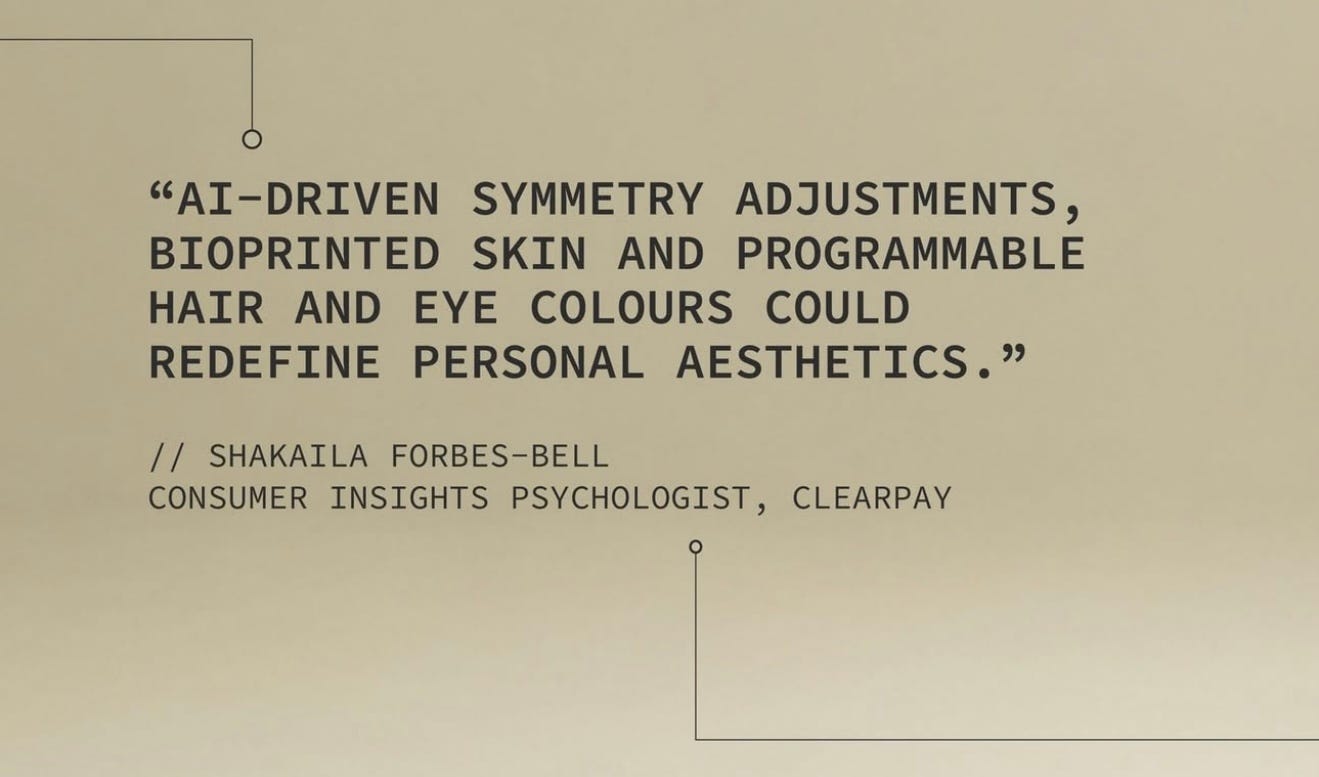



🐣 🤖 exciting future